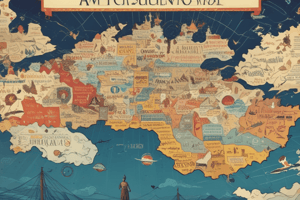Podcast
Questions and Answers
What is one consequence of ethnic diversity in African states?
What is one consequence of ethnic diversity in African states?
- Higher levels of inequality (correct)
- Enhanced national identity
- Faster economic growth
- Increased levels of public goods provision
What concept does Max Weber associate with ethnicity?
What concept does Max Weber associate with ethnicity?
- Socioeconomic status in society
- Human groups sharing a belief in common descent (correct)
- Political affiliation and ideology
- Historical development of nations
Which characteristic primarily distinguishes ethnicity from other identity types?
Which characteristic primarily distinguishes ethnicity from other identity types?
- Economic background
- Educational attainment
- Ascriptive characteristics (correct)
- Cultural practices
Which of the following is NOT commonly considered an ethnic identity?
Which of the following is NOT commonly considered an ethnic identity?
What is a potential impact of ethnic diversity on political parties in Africa?
What is a potential impact of ethnic diversity on political parties in Africa?
Which of the following does NOT represent a salient axis of ethnicity?
Which of the following does NOT represent a salient axis of ethnicity?
What effect does ethnic diversity have on national identity in African states?
What effect does ethnic diversity have on national identity in African states?
Which of the following factors does NOT correlate with ethnic diversity in African states?
Which of the following factors does NOT correlate with ethnic diversity in African states?
What was a significant outcome of World War II for African decolonization?
What was a significant outcome of World War II for African decolonization?
Which leader was instrumental in the establishment of the Organization of African Unity (OAU) in 1963?
Which leader was instrumental in the establishment of the Organization of African Unity (OAU) in 1963?
What characterized the decolonization experiences in Portuguese colonies?
What characterized the decolonization experiences in Portuguese colonies?
Joseph Mobutu's regime in Zaire was largely supported by which country?
Joseph Mobutu's regime in Zaire was largely supported by which country?
Which international document called for self-determination after World War II?
Which international document called for self-determination after World War II?
What type of movements gained momentum in the 1950s as a part of anti-colonial efforts?
What type of movements gained momentum in the 1950s as a part of anti-colonial efforts?
In Zaire, how much did the government spend on health and education combined in 1994?
In Zaire, how much did the government spend on health and education combined in 1994?
What was one of the key features of the ethnic landscape in Africa?
What was one of the key features of the ethnic landscape in Africa?
Which of the following does NOT represent a category commonly considered 'ethnic'?
Which of the following does NOT represent a category commonly considered 'ethnic'?
According to modernization theory, what is expected to happen to the relevance of ethnicity?
According to modernization theory, what is expected to happen to the relevance of ethnicity?
Which of the following theories suggests that ethnicity is fixed and historically determined?
Which of the following theories suggests that ethnicity is fixed and historically determined?
What does instrumentalism propose about ethnicity?
What does instrumentalism propose about ethnicity?
Which statement best reflects the premise of constructivism concerning ethnicity?
Which statement best reflects the premise of constructivism concerning ethnicity?
What criticism is commonly associated with primordialism regarding ethnic identities?
What criticism is commonly associated with primordialism regarding ethnic identities?
In which context did Robert Kaplan mention the concept of 'ancient tribal hatreds'?
In which context did Robert Kaplan mention the concept of 'ancient tribal hatreds'?
What does Marxism suggest about ethnicity in modern society?
What does Marxism suggest about ethnicity in modern society?
What is the general scholarly consensus regarding ethnic identity in Africa?
What is the general scholarly consensus regarding ethnic identity in Africa?
Which of the following best defines a state?
Which of the following best defines a state?
What is one of the roles of the state in society?
What is one of the roles of the state in society?
According to Weber, what is essential for a state to function?
According to Weber, what is essential for a state to function?
What key question addresses the issue of state formation in Africa?
What key question addresses the issue of state formation in Africa?
Why has the weakness of Africa’s states persisted after independence?
Why has the weakness of Africa’s states persisted after independence?
What aspect of state functionality does allocating radio frequencies pertain to?
What aspect of state functionality does allocating radio frequencies pertain to?
Which of the following factors is part of state formation in Africa and differentiates it from Europe?
Which of the following factors is part of state formation in Africa and differentiates it from Europe?
What impact did the discovery of Brazil in 1500 have on the Atlantic Slave Trade?
What impact did the discovery of Brazil in 1500 have on the Atlantic Slave Trade?
Which continent had the highest estimated shipment of slaves during the Atlantic Slave Trade?
Which continent had the highest estimated shipment of slaves during the Atlantic Slave Trade?
How did the demand for slave labor evolve in the 18th century?
How did the demand for slave labor evolve in the 18th century?
Which regions were largely involved in the Atlantic Slave Trade?
Which regions were largely involved in the Atlantic Slave Trade?
What was a major driver for the slave trade during the 16th and 17th centuries?
What was a major driver for the slave trade during the 16th and 17th centuries?
What was the estimated percentage of slaves that worked on sugar plantations during the 16th and 17th centuries?
What was the estimated percentage of slaves that worked on sugar plantations during the 16th and 17th centuries?
What can be said about the geographical distribution of slaves shipped during the Atlantic Slave Trade?
What can be said about the geographical distribution of slaves shipped during the Atlantic Slave Trade?
What was a significant factor that has resulted in less attention being given to slavery in the Muslim world?
What was a significant factor that has resulted in less attention being given to slavery in the Muslim world?
Flashcards are hidden until you start studying
Study Notes
State Formation in Africa
- States are political communities that have a defined territory and population, subject to one government
- States also have an administrative staff that has control over the legitimate use of violence
- States coordinate behavior, set standards, redistribute resources and provide welfare
- Decolonization was a protracted and often bloody process, particularly in Portuguese colonies and former settler colonies
- Anti-colonial movements gained momentum in the 1950s, fueled by the emergence of intellectual and political leaders
- The 1950s were a time of optimism, with several independence leaders advocating pan-Africanism
- Kwame Nkrumah, former prime minister of Ghana, was instrumental in the creation of the Organization of African Unity (OAU) in 1963
- World War II significantly impacted decolonization by seeing Africans fighting and shattering the aura of colonial invincibility
- The emergence of new superpowers with no interest in colonial systems also contributed to the end of colonialism
- The Atlantic Charter (1941) and the United Nations' notion of "equal rights and self-determination of peoples" shifted international norms
Ethnicity in Africa
- Ethnic diversity is correlated with increased risk of conflict, inequality, slower growth, lower levels of public goods provision, identity-based politics, and weaker national identity
- Ethnicity is based on ascriptive characteristics, including ancestry, kinship, culture, language, and religion
- The salient axis of ethnicity varies across countries, including race in South Africa, language in Canada, and religion in Northern Ireland
- Ethnic identities commonly considered in political science include tribes, clans, castes, races, and religions
- Modernization theory suggests ethnicity will decline as industrialization and urbanization progress
- Marxist theory posits that ethnicity is "false consciousness" and modern society will be organized along class lines
- Both theories failed to account for the persistence of ethnicity in industrialized countries
- Primordialism/Essentialism argues that ethnicity is fixed and rooted in societies, with ethnic identities trumping other identities
- Instrumentalism posits that ethnicity is fluid and a strategic choice by individuals to achieve political or economic ends
- Constructivism asserts that ethnicity is fluid but slow-moving, shaped by political institutions
The Slave Trade
- Europeans traded coveted goods with African middlemen in return for slaves, rarely venturing into the interior
- The trans-Saharan, Red Sea, and Indian Ocean slave trade occurred from the early Islamic conquests to the 20th century
- 6-7 million slaves are estimated to have been shipped to India and the Middle East
- The Atlantic Slave Trade began in the early 16th century, driven by the need for labor in Portuguese mines and coffee plantations in South America
- An estimated 9-15 million Africans were shipped to the Americas by various European powers
- The demand for slave labor increased in the 1600s due to North American cotton and tobacco plantations
- By the mid-19th century, the trade ended and slavery was abolished in Britain in 1838
- Less than 10% of transatlantic slaves arrived in North America, the rest were sent to the Caribbean or Brazil
- The Atlantic Slave Trade disproportionately affected certain regions of Africa, with specific ethnic groups subjected to high transportation numbers
- The demand for slave labor was driven by European involvement in trade with Africa and the rise of plantation agriculture
- The expansion of sugar, cotton, and coffee plantations in the Americas fueled demand for slave labor
- The 18th-century peak in slave trade coincided with the industrial revolution and the mechanization of textiles in England
Studying That Suits You
Use AI to generate personalized quizzes and flashcards to suit your learning preferences.




